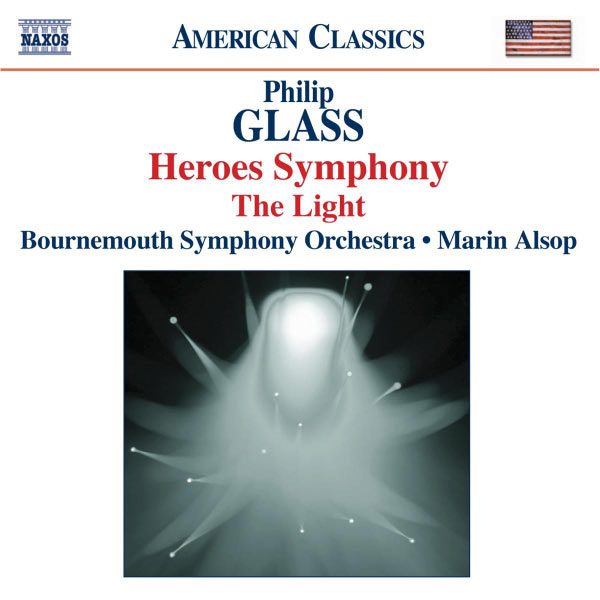
Streaming illimitato
Ascolta subito questo album in alta qualità sulle nostre app
Inizia il mio periodo di prova e riproduci l'albumGoditi questo album sulle app Qobuz con il tuo abbonamento
AbbonatiGoditi questo album sulle app Qobuz con il tuo abbonamento
Download digitale
Acquista e scarica questo album in più formati, secondo le tue esigenze.
Lingua disponibile: inglese
The Heroes Symphony of Philip Glass is one of two symphonies he wrote based on albums by David Bowie (the other is the Low Symphony). This recording by Marin Alsop, one of Britain's (and now America's) most talked-about conductors, suggests that the idea has been successful enough to move beyond the usual Glass orbit and into conventional symphonic repertory. Glass has always had a strong following among pop listeners, and part of the interest of these compositions lies in the unique crossover terrain they explore -- ironically, with Glass (whose versions are all instrumental) coming out as slightly more conventional than his pop counterparts. The Bowie album was recorded in the late '70s in Berlin with pop synthesizer experimenter Brian Eno. Glass fills out the songs with repeated musical figures, mostly assigned to the strings, replacing and expanding the guitar and keyboard riffs of the original songs. One can see why Bowie liked this music, which remains close to the harmonies of his original songs without seeming at all like an arrangement in the conventional sense. One can also see why the canny Marin Alsop might have wanted to record the work; she has been associated with several unusual crossover projects (including the Too Hot to Handel Messiah), and this one is unlike any other classical composition modeled on pop material. The Bournemouth Symphony achieves the hypnotic smoothness necessary for Glass throughout. The opening orchestral piece called The Light is a less distinctive Glass work, although rendered equally well. It refers to a famous scientific experiment having to do with light, but it would be surprising if any listener uncoached by notes succeeded in identifying which one.
© TiVo
Al momento stai ascoltando degli estratti.
Ascolta oltre 100 milioni di brani con un abbonamento streaming illimitato.
Ascolta questa playlist e più di 100 milioni di brani con i nostri abbonamenti di streaming illimitato
A partire da 12,49€/mese

The Light (Philip Glass)
Bournemouth Symphony Orchestra, Orchestra, MainArtist - Philip Glass, Composer - Marin Alsop, Conductor
(C) 2007 Naxos (P) 2007 Naxos
Symphony No. 4, "Heroes" (Philip Glass)
Bournemouth Symphony Orchestra, Orchestra, MainArtist - Philip Glass, Composer - Marin Alsop, Conductor
(C) 2007 Naxos (P) 2007 Naxos
Bournemouth Symphony Orchestra, Orchestra, MainArtist - Philip Glass, Composer - Marin Alsop, Conductor
(C) 2007 Naxos (P) 2007 Naxos
Bournemouth Symphony Orchestra, Orchestra, MainArtist - Philip Glass, Composer - Marin Alsop, Conductor
(C) 2007 Naxos (P) 2007 Naxos
Bournemouth Symphony Orchestra, Orchestra, MainArtist - Philip Glass, Composer - Marin Alsop, Conductor
(C) 2007 Naxos (P) 2007 Naxos
Bournemouth Symphony Orchestra, Orchestra, MainArtist - Philip Glass, Composer - Marin Alsop, Conductor
(C) 2007 Naxos (P) 2007 Naxos
Bournemouth Symphony Orchestra, Orchestra, MainArtist - Philip Glass, Composer - Marin Alsop, Conductor
(C) 2007 Naxos (P) 2007 Naxos
Approfondimenti
The Heroes Symphony of Philip Glass is one of two symphonies he wrote based on albums by David Bowie (the other is the Low Symphony). This recording by Marin Alsop, one of Britain's (and now America's) most talked-about conductors, suggests that the idea has been successful enough to move beyond the usual Glass orbit and into conventional symphonic repertory. Glass has always had a strong following among pop listeners, and part of the interest of these compositions lies in the unique crossover terrain they explore -- ironically, with Glass (whose versions are all instrumental) coming out as slightly more conventional than his pop counterparts. The Bowie album was recorded in the late '70s in Berlin with pop synthesizer experimenter Brian Eno. Glass fills out the songs with repeated musical figures, mostly assigned to the strings, replacing and expanding the guitar and keyboard riffs of the original songs. One can see why Bowie liked this music, which remains close to the harmonies of his original songs without seeming at all like an arrangement in the conventional sense. One can also see why the canny Marin Alsop might have wanted to record the work; she has been associated with several unusual crossover projects (including the Too Hot to Handel Messiah), and this one is unlike any other classical composition modeled on pop material. The Bournemouth Symphony achieves the hypnotic smoothness necessary for Glass throughout. The opening orchestral piece called The Light is a less distinctive Glass work, although rendered equally well. It refers to a famous scientific experiment having to do with light, but it would be surprising if any listener uncoached by notes succeeded in identifying which one.
© TiVo
Dettagli della registrazione originale : 70:09 - DDD - Enregistré à la Salle de concert, Lighthouse, Poole (UK) en mai 2006 - Notes en anglais & allemand
A proposito dell'album
- 1 disco(i) - 7 traccia(e)
- Durata totale: 01:10:03
- 1 Libretto digitale
- Artisti principali: Bournemouth Symphony Orchestra Marin Alsop
- Compositore: Philip Glass
- Etichetta: Naxos
- Zona: Etats-Unis d'Amérique
- Genere: Classica
- Periodo: Musica contemporanea
- Collana: Naxos American Classics
(C) 2007 Naxos (P) 2007 Naxos
Migliorare le informazioni sugli album
 Perché acquistare su Qobuz
Perché acquistare su Qobuz
-
Ascolta la tua musica in streaming o download
Acquista un album o una singola traccia. Oppure ascolta il nostro intero catalogo con i nostri abbonamenti streaming illimitati di alta qualità.
-
Zero DRM
I file scaricati ti appartengono, senza limiti d’uso. Puoi scaricarli tutte le volte che vuoi.
-
Scegli il formato più adatto a te
Scarica i tuoi acquisti in un'ampia varietà di formati (FLAC, ALAC, WAV, AIF ...) a seconda delle tue esigenze.
-
Ascolta i tuoi acquisti sulle nostre app
Scarica le app Qobuz per smartphone, tablet e computer e ascolta i tuoi acquisti dappertutto.



